The World Water Day that falls this Saturday is better known and more widely celebrated. It began as a UN initiative in 1992, but has caught the public imagination in the last few years with the growing need that urban citizens and farmers in our rural eco-systems are beginning to see as a threat that will be even more serious than the energy crisis in India. With 75 per cent of our city fresh water needs now being met from deeper ground aquifers that are running today alarmingly low, the World Water Day only means that each of us have to doubly resolve to grow our own water in apartments, in villa-enclaves, in city wards and in residential extensions as well as office blocks.
There has to be localized community initiatives within wards and sub-regions of a city to treat water for use, harvest and husband rainwater to supplant municipal water supply, and bring efficiencies in showers, taps, faucets and other fixtures in our homes, hotels, hospitals and offices.
Platitudes and public speeches will not help. Asking people to focus attention on water issues will be lost on citizens who are asking how to do it, and not why they should do it. Awareness, I believe, is not the challenge; it is the ability and know-how that is not spreading fast enough.
The World Water Day offers pause for such reflection. Like charity begins at home, can you mark this World Water Day with these simple initiatives that don’t cost money as much as your resolve and willingness to do it.
ZEDGraffiti
The ZED Way of Thinking & Living
BCIL grows up
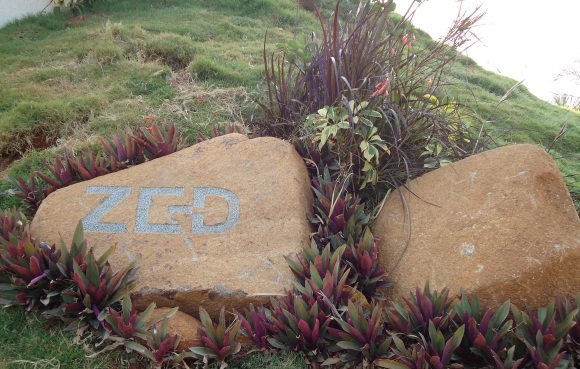 A quiet milestone went by without fanfare on Feb 13. BCIL completed 19 years and moved into its twenties.
A quiet milestone went by without fanfare on Feb 13. BCIL completed 19 years and moved into its twenties.
It’s been a long journey for what was a fledgling idea and a spirit. The idea has taken root. It has turned into reality that many have accepted and bought into as customers. It has nurtured strengths and capabilities that are rated among the best in the world. It has earned testimony from across the world for not just the resolute directions that BCIL has driven, but also for the success that it has achieved.
It is hard to say whether it could have accomplished more; there will always be the feeling that we could have been a company with greater accomplishment and greater reach on the market.
We have built assiduously and with determination. We have worked hard, with results that some say is not good enough, some say amounts to nothing significant at all, some say is envious for the daring the courage to stay the course on sustainability. It’s been a long ride, alright, from 1994 when the company struggled into form.
It has seen five economic cycles and it has weathered each of them with dignity and doggedness of spirit.
The credit goes to all those who have shown courage and determination in the face of the worst of odds. Many have sacrificed earnings and time and work hours in order to make it happen.
Happy Birthday, BCIL! But more important is the debt of gratitude for many who have made it happen, starting from Burjor Kothawalla and Kanchan Kaur, who were among those who grew the organization in its infancy. Viren Varma, now no longer with us, who gave BCIL the first push of encouragement to get BCIL born. That was in May 1994, nearly a year before the company was born.
People like Basavaraj and Ajay Chandrashekhar were also part of the initial growing up. There were then many others who came in and gave their lot to help the company grow by the inch while it stayed on course through the difficult years. Selvaraj has grown to be an important brick in the wall. Others like Shobha have been on the sidelines but part of the scene.
There are many from the distant past who visit us and are surprised that the company is doing as well as it is today. And their surprise comes perhaps from the fact that most of them had never given a chance to BCIL for its ability to last as long.
Into the future, growth is assured because of the inherent strength that the company has built into its DNA under the able leadership of professionals of an extraordinary kind, the next set of generals. They are set to steer the company towards greater strength and consolidation. The depth built with the rest of the officers today is also going to be part of that story for the next five year.
Their commitment is extraordinary. Their faith in the values and ability to steer business is beyond the normal. BCIL has come the distance, and is set to take on the next decade of growth.
Says Sanjay, “We are good for at least three more projects and it’s about time we got to launching them and proving our prowews.” I recall Vinay saying a couple of years ago, “We can do twice as much as projects as we have now on hand.” With Dinesh’s extraordinary talent at technology and value engineering, the team is well set to deliver. Amiy Roy captured it well, “To me BCIL is still a start-up. There is the vitality and energy that you find only in baby.”
BCIL’s media campaign well on way
 It has been a quiet start, nothing avert and brash. There is dignity in the messages that the hoardings have carried. There are a dozen hoardings in the city today, all of them beyond the noise and decibel of the standard sets of ads that the builder tribe usually puts up.
It has been a quiet start, nothing avert and brash. There is dignity in the messages that the hoardings have carried. There are a dozen hoardings in the city today, all of them beyond the noise and decibel of the standard sets of ads that the builder tribe usually puts up.
BCIL continues to bet on the goodness and the good sensibility of people out there in the market. We believe that there are enough people who care and who want to buy responsibly. Like an ad that I recently saw of another company, they don’t just want to feel good about buying but also want to feel good about having done some good to the community, to the city, and the planet at large.
The media campaign has taken more avenues with clearly only one direction: secure discerning brand visibility, get people to know about us.
Believing is important. But seen to be believing is equally important in a world that has such short attention spans that recall has to be nudged often in the public space.
Amir Roy, cmo, has spent enough time to understand what he needs to put out on the website. His biggest challenge was that there was so much to be said, so much as material that already exists. The messages had to convey the deep conviction and the sense of extraordinary concern on sustainability that our writings have carried. Yet it had to be relating to the customer in terms of what the benefits would be.
Dear reader, you are one of those who have related powerfully to these values that BCIL talks about as a thought leader. You have respected us as a thought leader but have often wondered why we have not secured greater commercial success than we have so far. The national chairman of the IGBC had this to say at a meeting recently, “the extraordinary talent and services and products that you have should be reaching at least 100,000 more people than you are actually now reaching.”
A ZED resident and senior director at a big firm told us recently, “The values and extraordinary capability that resides within BCIL’s top-end professionals should put the company in the top bracket very soon. You only have to get your act on execution together.”
We have missed many things. We have dropped many balls. We have not delivered to many customers. We continue to be transactional when we ought to be relational, but we are aware of it and we are working on it.
We will make a difference in the way that the website will communicate; in the way that we will communicate to our customers; in the way that we will communicate within BCIL among every soldier who is working toward fulfilling our objectives.
ZED takes to the radio
 It was on an invite from FM Rainbow. It was a primetime hour. It was a chat show for one hour. The series was called the Citizen Chat and was featuring leaders in the city who were doing their bit to push the frontier of thought and action in areas of their domain expertise.
It was on an invite from FM Rainbow. It was a primetime hour. It was a chat show for one hour. The series was called the Citizen Chat and was featuring leaders in the city who were doing their bit to push the frontier of thought and action in areas of their domain expertise.
When Hariharan was invited for the show, he sat together with the anchor of the Sanjay Das and constructed the chat. The feedback was discerning, though very minimal. A show of this kind is lost in the decibel and the cacophony around us of many media options that viewers and listeners have.
BCIL is now set out to have a series of such a radio chats. There is more to come. Watch this space.
Meanwhile, you may want to listen to this chat, which is an edited version of what was carried on the radio on Feb 15, 2014. https://www.youtube.com/watch?v=Z_hiCOpoGrM
Listen to a Wise Man
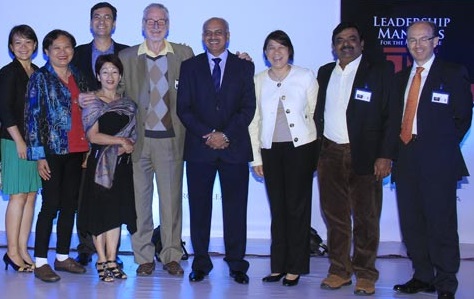 The last edition of ZedWorld carried a feature on coach Krishna Kumar who speaks in homilies, who speaks in simple words, who carries clarity in his thinking and who is observant, watchful, and nudging people’s talent into position.
The last edition of ZedWorld carried a feature on coach Krishna Kumar who speaks in homilies, who speaks in simple words, who carries clarity in his thinking and who is observant, watchful, and nudging people’s talent into position.
There is a big difference in being a mentor and a coach and Krishna Kumar falls in the latter category. Listen to him speaking. You will resonate with many of those values that he articulates. Here are universal truths but spoken with great pragmatism and a watchful eye to practical application. Check this out. https://www.youtube.com/watch?v=A4NoxnMRjtk
Harikrishna Addresses Kochi Architects
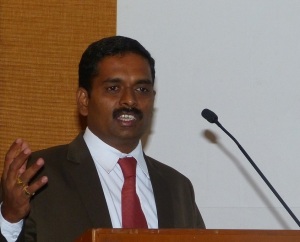 The conference was on intelligent sustainability. The theme covered a design tour that has been carried as a road show across a few cities in India.
The conference was on intelligent sustainability. The theme covered a design tour that has been carried as a road show across a few cities in India.
Harikrishna, Chief Care Officer, was invited to participate in a panel discussion. There were other eminent architects and leaders of sustainability present in the panel. Says he, “The message on zero energy buildings of Group ZED offered deep impact as usual.”
His regret was evident. He would have had so much more to say as part of the story of ZED if the speakers had only been offered more time. There are many stories that make for the whole that ZED represents. The sum of these parts is greater than the whole in many ways.
There are more such invitations to address distinguished professionals who are making the change towards green, energy-efficient and intelligent buildings that will pave the way for making cities sustainable. The role of ZED and of its professionals in this India Story of the 2020s is significant.
Watch ZedWorld for more such news.
BCIL signs MOU with Fujairah Company
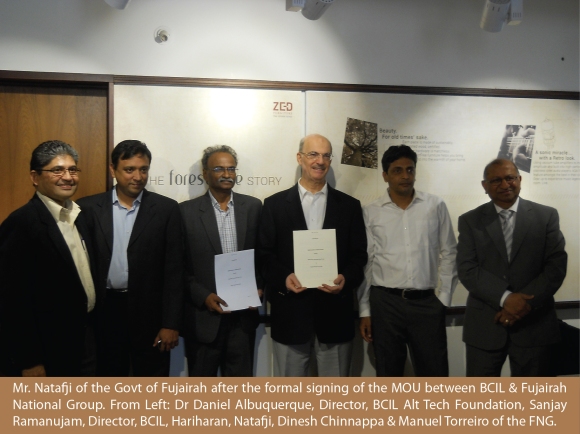 A delegation from the government of Fujairah made a two-day visit to BCIL for talks on creating markets for energy-efficient housing and ZED Products and services in the entire UAE region and the GCC countries.
A delegation from the government of Fujairah made a two-day visit to BCIL for talks on creating markets for energy-efficient housing and ZED Products and services in the entire UAE region and the GCC countries.
Muhammad Natafji who has served for nearly all his life as a key aide and professional advisor to the Emir of Fujairah, His Highness Sheikh Hamad bin Muhammad Al Sharqi, led the two-member delegation to Bangalore. Mr Manuel Torreiro, who presides over all Health programmes in the Emirate of Fujairah, accompanied Mr Natafji on this business visit.
BCIL signed an MOU with Fujairah National Group which will convert into a joint platform for business after approval from the Board of the two companies, and the personal approval from his highness the Emirate.
A return visit was paid by Dinesh C S, Technlogy Director at BCIL. During his visit he took stock of the state of operations of the different enterprises that operate under the Group. Preliminary studies show there is an excellent fit that BCIL can offer in services and products to enhance cost and quality efficiencies of the FNG’s different building assets.
A ZED Company will be promoted in UAE jointly with the Fujairah National Group. It will promote business interests in areas of Housing, Energy-efficient Products and Home Appliances, ZED Harvest Folio Sprays and other organic enhancers for plants and urban ecology, ZED Solar Solutions, as well as the exclusive designer range of furniture.
BCIL Altech Foundation will stage its presence in UAE with skill sets training and development programmes that Dr Daniel Albuquerque, Director of BCIL Alt Tech Foundation, will soon launch.
After his visit and extensive discussions, Mr Natafji said, “The ZED Villas are world class. I love the finishes, the colours, the designs. The master washroom was a delight with natural sunlight and greenery right inside the toilet!’
When asked about the quality of interaction that he had with the top management at BCIL, he observed, “I came with low expectations and have been bowled over by the rarely seen high-quality knowledge and ability. My decision to create a joint partnership with ZED was made at the very first meeting. I look forward to long years of a sustained business relationship.”
Dr Daniel Albuquerque as Director of BATF has been working on this potential partnership for nearly a year. His persistence and clarity of objectives as played a critical role in shaping this important initiative for BCIL.
The Why of ZED
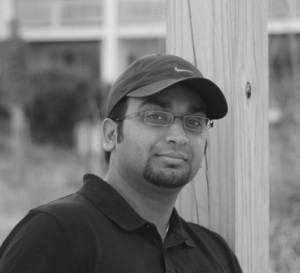 To most organizations the What and the How are important. But often lost in the anxiety for growth is the Why that fuels the energy within. At BCIL the constant reminder of the vision has nurtured a deep and abiding passion and commitment that is extraordinary. The Why of Zed is a column that will feature every edition with one Zedder’s reflections. For the first of this series, we invited Sashi kiran, Technical Officer, who presides over commercial and technical aspects of the ZED products. Sashi is an engineer with a Masters degree from the University of Tennessee in the U.S. He spent about a year and a half working there before returning to India to apply for a Doctoral in the area of Nano Electronics at the Indian Institute of Science. He chose after a short stint to step out of the Doctoral program and joined BCIL. Excerpts from a conversation with him:
To most organizations the What and the How are important. But often lost in the anxiety for growth is the Why that fuels the energy within. At BCIL the constant reminder of the vision has nurtured a deep and abiding passion and commitment that is extraordinary. The Why of Zed is a column that will feature every edition with one Zedder’s reflections. For the first of this series, we invited Sashi kiran, Technical Officer, who presides over commercial and technical aspects of the ZED products. Sashi is an engineer with a Masters degree from the University of Tennessee in the U.S. He spent about a year and a half working there before returning to India to apply for a Doctoral in the area of Nano Electronics at the Indian Institute of Science. He chose after a short stint to step out of the Doctoral program and joined BCIL. Excerpts from a conversation with him:
“As a company we have tried to provide sustainable solutions with a wide range of product offerings – from homes to off-the-shelf buys. We have also tried to educate people on the need to think in this direction and show them that today a lot is available that can help us live a sustainable lifestyle. We have tried to show them (with some success) that the concepts/ideas that we share are relatively easy to achieve without going out of our way with respect to a major change in lifestyles.
“There is a need to prove our purpose. We need to change many things if we have to fulfill our purpose. The lack of quality in execution. When people look at a badly done job, it hurts. Every other builder sells a piece of slab calling it a home. The attention to detail is what we are known to be different about. Inside homes, when I see the edge of walls rounded off, it makes me happy because that is a detail which will avoid chipping of the wall edges, at the same time wont injure kids or the elderly.
“Folks within say there is a big disconnect between the drawings that go out from here and the execution that gets done. Just because the client has asked for it, 15 amp plugs are given, when the wiring is designed to only stand 6-10A. Any overload can cause burning of wires.
“We have an excellent set of products that do what they claim. But we do not have the right set of sales or marketing skills.
BCIL can go big time with ZED products, but we need to build a backbone for it. We need people with finesse in installing, not just brute force labor. We need people who pay attention to detail.
We have set ourselves certain standards, way above the rest of the world. But most executing people within the company are either not aware of those standards or they don’t care about them. Either way we lose … on reputation, on customer belief.
We need to look at Quality—what the client sees, as well as things not visible to them. The ZED edge on technology and products must combine with the way we build. That is a winning combination. It is not product delivery. It is how our people deliver.
ZED Walden makes headway
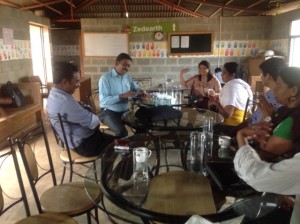 The enthusiasm is infectious. The team of Shashi Kartik, Shobha Devi, Thampi Sabari, and Harikrishna is forging the program of ZED Walden quietly but with steady firming up of the plans.
The enthusiasm is infectious. The team of Shashi Kartik, Shobha Devi, Thampi Sabari, and Harikrishna is forging the program of ZED Walden quietly but with steady firming up of the plans.
Sridhar has been motivating force with his inspiring network connection. An Ashoka fellow Shubhendu has pitched in with some hard inputs on how they can create a Walden in Bangalore that will relive the timeless idyll that Henry David Thoreau portrayed captured in Of Walden Pond in the 1860s.
The emotion is powerful. The aspiration of every urban citizen to create an oasis of quiet, of piece, and of eco-balance is as old as time. But there is not enough of such coordinated energies to make the ideal reality in a world that is moving at speeds that make things a blur,” says Thampi Sabari, a senior IT professional and Zed resident. “To me it’s been a ride of huge learning. I am waiting to sink my teeth into the deeper challenge of taking such an ideal of sustainability and making it work within the grid of process and systems.”
Dr. Shashi Kartik who earned her thesis on watershed management from the Punjab University many years ago, and Shobha Devi, Head of Landscaping at BCIL, as a team steer execution at ZedWalden.
Watch this space for more on the Walden program in the next edition, for the team is still evolving the plan.
The India Story … of Missed Opportunities
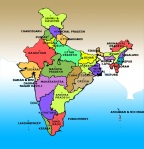 In any forum outside the country people talk (albeit with less excitement now than in the past) of the India story. Here is a slice of the India story that is not so alluring.
In any forum outside the country people talk (albeit with less excitement now than in the past) of the India story. Here is a slice of the India story that is not so alluring.
There was a chief minister in 1992 of the smallest state that India has had, Goa. He was a politician who had grown up the ranks and among the minority who was not corrupt and still retained a sense of the ideal.
One morning he stumbled upon a report, more a set of reflections, which an emigrant Goan who had landed back on her shores after years in Germany, had written for a local newspaper. He asked his office to summon this person and to see if he could listen to him and take his ideas further. One morning’s visit translated into Prof Dr. Daniel Albuquerque becoming his advisor on matters across the board of importance to Goa. And so began a series of morning sessions with the chief minister. The agenda was across the spectrum of administration, law and order, development, and the future of Goa.
A project that a Japanese delegation brought at the time was for the creation of a 105-km rapid transit road from the South of Goa to the very north of Goa. A Japanese team that came to meet the CM offered this on a platter—no cost to be incurred by the Goan government, the consideration being a stretch of land being given to Japanese for a golf course that they wanted to create close to Pernem on the north. That is all that the Goan government had to give and the proposal also clearly enunciated that the project will be committed to no ecological damage through the stretch of land that would be used for such a mass transit road cutting vertically through the state.
The transit road was to be structurally elevated so that minimum land intervention or obstruction was created.Imagine a 105 km long bridge or fly-over with such breathtaking scenery along the Goan coast. This would have created a ‘Riviera effect’. Japan would have brought in the best technology and above all a work culture which would have taught the laid-back Goan a workout in work ethic that is supreme in the world.
If the experiment was economically successful and environmentally sustainable, which were both commitments offered by the Japanese, the entire coast of Goa would have seen a massive transformation.
Another project was one for the creation of an oceanarium. Somewhat on the lines of those that had already been created in Miami, Florida on the US east coast. It would have showcased Goa as a tourism destination and transformed the state’s ability to boost tourism revenue. There was a third project for the creation of an 8-lane highway that would cut across the mountains west to east till Belgaum from Panaji.
All projects were scuttled simply because of the little men within the system of politics and bureaucracy. None of them would want it this way, for it meant no money for themselves. They raised socialist slogans that meant nothing. They did not want development of a kind that would only benefit the rich.
This story of missed opportunities of one Goa is no exception. This has been the rule across many states. In 1980 the state government in Karnataka secured a proposal from VittalMallya, a prominent broker and brewer in the 1970s, for the creation of a satellite train system that would cut around the periphery of Bangalore. The cost at the time was no more than about Rs100 crores. It would take no less than 100,000 crores to be doing such a public transportation system in Bangalore today!
There’s a certain perverse and relentless logic from the politician who’ll do all he can to retain the status quo. And the babus of bureaucracy have not had the spine to speak until they retire, or not at all for it serves their own pockets, too.
It’s a vicious spiral. Keep the supply suppressed, of all things infrastructure-related — energy, water, waste management systems, roads, parking lots, transportation, the entire gamut.
Keep the economy in a constant state of want. Push the demand so high and as artificially to a point where there’s value pricing—have you noticed how you pay Rs170 for a box of poha or upma midair on Indigo? Or a whopping Rs 100 for a cup of insipid coffee at a fancy joint that believes making you wait is part of the value-added service? Not to speak of the numbers of things denied for consumers across every social and economic spectrum.
–XO Team
You must be logged in to post a comment.